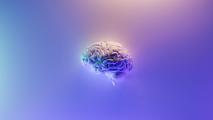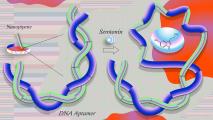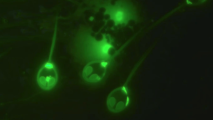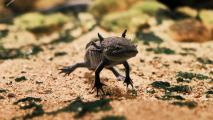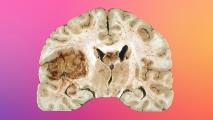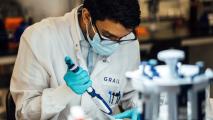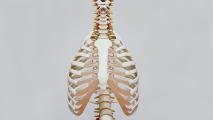
Biotech
Human history has been all but defined by death and disease, plague and pandemic. Advancements in 20th century medicine changed all of that. Now advancements in 21st century medicine promise to go even further. Could we bring about an end to disease? Reverse aging? Give hearing to the deaf and sight to the blind? The answer may be yes. And soon.
More
Study finds a striking difference between neurons of humans and other mammals
Researchers identified a “building plan” that holds true for every species they looked at — except for humans.
New Alzheimer’s drug slows mental decline by 27% in clinical trial
Eisai and Biogen are reporting that their new Alzheimer’s antibody slowed cognitive decline by 27% in a global trial.
Shape-shifting DNA is helping researchers decode the human brain
Researcher Nako Nakatsuka has turned to DNA to tackle an important challenge: how do we measure chemicals in the brain?
What’s causing the alarming rise in cancer for adults under 50?
A new review finds that 14 different cancers, including eight related to the digestive system, are increasing in people under age 50.
Brain-zapping tech improves memory by more than 50%
A brain-zapping “memory prosthesis” funded by DARPA improved trial participants’ ability to retain new information by more than 50%.
I’ve had COVID and am constantly getting colds. Did COVID harm my immune system?
Does COVID somehow weaken the immune system to make us more prone to other infectious diseases? Here’s what scientists know.
Scientists discover animal that doesn’t need oxygen to live
The parasite infects salmon and lives within the fish muscle, though scientists aren’t quite sure how it breaks down nutrients for survival.
Creatine, a popular exercise supplement, might help treat depression
Creatine shows promise as a treatment for depression, boosting the effects of SSRIs and potentially working as a standalone medication.
Axolotls can regenerate their brains
Axolotls are a model organism researchers use to study a variety of topics in biology because of their regenerative abilities.
World’s first cloned arctic wolf is now 100 days old
After two years of effort, China’s Sinogene Biotechnology has created the world’s first cloned arctic wolf.
New treatment “starves” aggressive brain tumors in mice
A treatment that “starved” aggressive glioblastoma tumors in the brains of mice suggests a way to finally fight the deadly cancer in humans.
Are near-death experiences just psychedelic trips?
One possible explanation of near death experiences is that our brains are flooded with a hallucinogenic, DMT.
Meth addiction treatments are finally on the horizon
New antibody and drug therapies may soon help treat meth patients, who currently have no pharmacological interventions.
Identical twins were raised in different countries. Here’s how they differ today.
After being separated as toddlers, two identical twins were raised apart in the US and South Korea.
When remains are found in a suitcase, forensics can learn a lot from the insects trapped within
The investigation of human remains in a suitcase can often represent a Pandora’s box, full of complicated problems.
Blood test can find dozens of types of cancer, with few false positives
Grail’s Galleri multi-cancer blood test found multiple cancers in a study of over 6,000 patients.
ARPA-H: High-risk, high-reward health research is the mandate of new, billion-dollar US agency
A new multibillion-dollar federal agency was created with a goal of supporting “the next generation of moonshots for health.”
Americans are becoming more likely to cooperate with strangers, not less
Americans are more likely to cooperate with strangers today than they were in the 1950s, according to the American Psychological Association.
Long COVID: Self-targeted immune attacks may lurk behind it
Researchers are working to get a more complete understanding of the cells and antibodies behind long COVID.
San Francisco decriminalizes plant-based psychedelics
San Francisco joins Oakland, Santa Cruz, DC, and Denver in decriminalizing some psychedelics.
Get inspired with the most innovative stories shaping the world around us.














